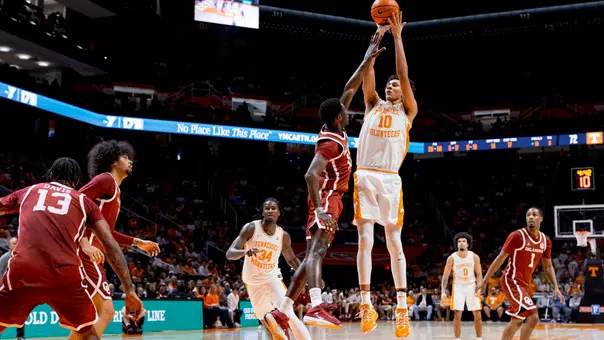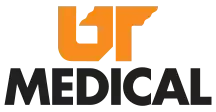University of Tennessee Athletics
Rick Barnes Media Monday
January 23, 2017 | Men's Basketball
KNOXVILLE, Tenn. -- Head coach Rick Barnes met with reporters on Monday at the Ray & Lucy Hand Digital Studio to preview Tuesday's home showdown with No. 4 Kentucky (9 p.m. ET, ESPN).
A full video replay of the press conference can be viewed above while the full transcript of his comments can be found below.
Tennessee head coach Rick Barnes
(On what he remembers from last year's win against Kentucky)
"I think about Kevin Punter and Armani Moore more than anybody. Two years ago those guys, regardless of where we were with our program, those guys competed. I think back to that game and we got behind and we just stayed with it. Games can turn quickly and we know that. When I think of that game I think of those two guys particularly because what they have is what we are searching for this team to have. It's a tremendous will to compete every possession."
(On team difficulties with the shot clock)
"I think we miss so many scoring opportunities early in the clock. Like most teams we want to be aggressive and score early and take the open shots. When you watch certain players at certain times they get tentative and they don't take those shots. When this happens it puts us in a position where we are scrambling and we stop moving. We talk about flow a lot because good teams are going to take away your first couple of options and you have to continue to play high percentage basketball, but it takes five guys to do that. When the ball sticks in one guy's hands often times it is because the others guys aren't doing their job, but I would rather take a bad shot than turn the ball over. If you take it, you might get lucky and make it or get an offensive rebound. We don't like getting into those situations because we shouldn't be, but when we do get there most good teams know exactly what to do in those situations. Most teams can go to a ball screen or spread it and let guys go, but I think the best teams don't worry about the clock. They play the possession and they keep going. If we would just keep our movement going, we believe that it is hard for somebody guard you for 30 seconds and someone will break down somewhere. Somebody will look at the clock at eight seconds and think they need to stop the ball from moving and do something else, but you need to keep playing through that. Eight seconds is a long time in the half court and one of our problems early was that many of our guys weren't even looking at the clock, which is not unusual with high school not having a clock. I just want to see us work on our flow and believe in it."
(On Kentucky guard De'Aaron Fox)
"What makes him go is that he is fast and quick and he is long. He can create problems with his defense. I think any coach loves when a guy can get in the back court and work. He has great stamina for a guy his size. He can shoot it, obviously, but he can also get it to the rim and pass it. He can rebound and go with it. I don't think there is much he can't do. With or without him I think Kentucky is an outstanding team. I think John Calipari has done a great job, again, to get these guys to play the way they are playing and to get them to be effective. Again whether he plays or not I still know that there is an attitude that if one guy goes down another will step in and keep it rolling."
(On if the Vols have been hardened by the difficulty of this year's schedule)
"I don't think there is any question that it reveals a lot about where you are and how tough you are. I have said from Day One that we want to be a national program and to do that you have to play a tough schedule. I think Tom gave me a stat that says that we have four teams in our league who are in the top 10 in our league with strength of schedule, obviously us being one of them. I do think it helps you and it might not be as pretty when you look at your record, but I can tell you that it's always been our philosophy. We have always played that kind of schedule, and yeah, we could have had more buy games, but that is not the route we wanted to go."
(On how assist-to-turnover ratio relates to wins and losses)
"I do think when you look at assists and turnovers, taking care of the ball is the most important thing and players have to understand that. Teams that turn the ball over least and rebound win most of the games. From an offensive standpoint, when you are assisting that means you are moving the ball around as opposed to one guy putting his head down at the end of the shot clock. I like it when the ball is moving, but sometimes your opponent isn't going to allow that to happen. They are going to challenge passes and force you to drive the ball and you are going to have to make that adjustment as well."
(On Kentucky guard Malik Monk)
"One thing about him is that as a team Kentucky is terrific. You can see them scoring within three seconds in a variety of different ways. They rebound from a made basket and get the ball and drive it down the floor and make it in three seconds. You shoot a jumpshot and they rebound it and they are right back down there scoring, sometimes at the rim. (Monk) is the kind of player that you can guard him really well and he can still make shots. The key with that is you can't let him affect you mentally. He is a good enough player that he can make the tough shots. Obviously being the leading scorer in the league tells you that he can go and get a bunch of them which he has already proven in his games this year. It isn't just him. We are just going to do our scouting and do everything we can to make it tough, but they are such a good team if you just focus on one guy they can hurt you in a lot of other areas. They are a smart team when you watch their sets with what they do. If you guard it, they are going to have a counter for it so they are where they are because they are an outstanding team. They aren't just a one- or two-man team."
(On Kentucky's stature in the SEC)
"I think when you talk about Kentucky and Kansas, I would say they are at a level beyond everybody else. It is as simple as this: I have never been in Allen Fieldhouse without there being people lined up hours before the game to get in the building. You could feel the buzz last year when we went to Lexington and played. I don't know what it is like around the arena before the game because I didn't see it, but the excitement around those two programs is because they have been good for many years. They have been a factor in college basketball. North Carolina is a program I have respect for, but if you look at the factor of every game being sold out then you have to look at those two teams. Those are the only two teams I think that sell out every single game. I think the arena at Kansas is around 17,000 and (Rupp Arena) is 23,000 and I don't know of any other program in the country that can say that. You can see that is where they have had great success. Everyone talks about a football school or a basketball school, but I have always said that you are what you are good at. Kansas' football stadium is bigger than their basketball arena and so is Kentucky's, but they have been good in basketball for so long, just like Duke University. You look at them and they have the smaller gym. But in the case of a big stadium selling out you have to look at those two programs."
(On the impact the fans could have for both the Volunteers and the Wildcats)
"Well, that's another part, both of those schools that we talked about, have really good fan support. I can remember at Texas, when we'd play Kansas, they would have a crowd there. Kentucky has terrific basketball fans. They really do, and they love to travel. You could feel it a year ago in Nashville, at the conference tournament; the same in Kansas City with the Big 12 Tournament. There are other teams in the Big 12 Tournament that travel well, too. I thought they (our fans) were really good, and we appreciated them being there for the game Saturday, against Mississippi State. We want to be at that level we're talking about right now. I want people to think of the University of Tennessee and our fans as being the very best, coming out every game. And I'd like to get to a point where we're disappointed if Thompson-Boling (Arena) is not sold out."
(On whether it's harder or easier to coach a one-and-done player)
"You couldn't ask, ever, to be able to coach a guy better than Kevin Durant. Believe me, it's a once in a lifetime thing for some people. The fact that you have a guy with a great passion, great teammate, figures it out. Then, you have some guys that think they're one-and-done that aren't, and they can be difficult. It really can be. It can happen. It does happen. I admire what John (Calipari) has done with his program. The fact that he's done a great job of meshing those guys. Because, you go back, and he's coached some guys that are just like that second guy that thought they were one-and-done, came in, and stayed two, three, maybe four years. I admire those kids that figure that out, too, that realize, 'Maybe I'm not a one-and-done guy or two-and-done guy. Maybe I'm a three or four-and-done guy.' I think I mentioned this to the Commissioner (Greg Sankey). Rob Lanier told me this, and I think he's absolutely right. One of the biggest awards that we should give in the SEC is 'Most Improved Player.' I think it should be a big thing to want to come back and be the most improved player in our league. It all gets down to the individual. I can tell you this, Kevin Durant did not come to the University of Texas with that mindset. He came there to improve, and to be the best he could be. Everyone that knew him, knew it would be that deal, but he put both feet firmly in. He did not have one foot in and one foot out. I think that's what John (Calipari) has been able to do, for the most part, with his group of guys year in and year out. He gets them to buy in, and put both feet in. He makes them understand it's special to play for a National Championship, and win it. Again, it goes back to the individual person and player."
(On being ranked third in the conference in offensive rebounding but 12th in defensive rebounding)
"Well, I don't think we're going to outjump anybody, in terms of defensive rebounding, if we don't block out. Often times, one reason we might be able to get to the offensive glass more is because people don't block out. We're able to use our quickness and get around them. It's a little bit different trying to get there as opposed to, on the defensive end, keeping somebody from getting there. Then I could also say maybe it's a selfish thing. You go get an offensive rebound, and you think you're going to be able to score. I think both of them are really important, but when you have to have one of them, you want to be a good defensive rebounding team. You want to be able to finish possessions, but that's a mindset. I think that's one of the areas of the game that is mental toughness. Great teams that play great defense are mentally tough in the fact that if you get one shot, it's only going to be one. It's a really hard thing to play against, if you know you're playing against a team that is a great defensive rebounding team."
(On if last year's win over UK will give any current Vols confidence going into the game)
"I don't know. I guess you'll have a chance to ask them that. I mean, it's two different teams, really. We're a different team. They're a different team. This isn't 'coach speak' or any of that. They're the next team that we're going to play. We're the next team they're going to play. John (Calipari) is going to go about his process, like he will be getting ready for the Kansas game, like we will for the Kansas State game this weekend. What we're doing here, it's a matter of concentration, getting your mindset, getting focused on what you have to do. Emotion can win for you sometimes. There's no question about it. I think that probably helped us last year as much as anything. Emotion can win for you, but it can't win for you all the time. It can't. We see it happening in college sports more so than professional sports. But I think last year, when we got down, we fought back. I remember our fans were unbelievable. I thought they were great. I do think our guys fed off that. I watched the South Carolina game in Rupp the other day. South Carolina clawed back, fought back, and (Kentucky's) players kept answering it. Their fans kept answering it with them. Again, because we're dealing with young people, I think emotion can be a part of it. Looking back on last year's game, I guess what we can take from it is if you get down and you're willing to fight back, you can fight back. But if you're not, you won't get back in it, because they're not going to let you up, if you're not willing to fight for 40 minutes."
(On Kyle Alexander's progress)
"He's been up-and-down a little bit more than normal, but he played really well the other night. He was really good. He, defensively, probably did as good of a job as he's done all year in transition defense. He so wants to please, in terms of trying to do what he needs to do. The fact that he hasn't played basketball for a long period of time, he's just going to lock into doing his job. He gets so focused on it sometimes that he's not aware of other things that are going on, which is only going to come with time. We have a lot of confidence and belief in him because of his commitment to the game and how hard he works. Your players tell you a lot about where they are mentally. After we win a game, we come in and we're not going to do much on Sunday, after a game, other than watch some tape, shoot some free throws. But then you watch guys like Kyle. You watch guys like Admiral (Schofield). You watch guys like Lamonte Turner and Grant Williams. They want to work out. It tells you something about them. It tells you that it really means something to them. You wished all your players had that, but they don't all have it. People want to know why certain guys play more than other guys. It's because of that. You've got to have a passion for this game. Me personally, and I think our staff and our program, we've had the success that we want to have is built on guys that we know are fully invested in it, and really, truly have a passion to do this. That's where we talk about our culture. We've got a good one, but it can be a lot better if you've got a whole group of guys that just say, 'Well, I didn't play as much as I wanted to play the other night, so I'm going to get in the gym, and make sure I stay in shape and get better. But it's a whole lot better when they do it on their own. Yesterday, we didn't ask any of those guys to do it. They did it. That's when you know you've got some guys in the program that certainly are thinking the way you want them to think, and thinking in the way that we need to have going forward."
(On John Fulkerson's status)
"I think in some ways, I think this is a little bit unchartered for me as a coach, and maybe our training staff, with a dislocated elbow. I don't think I've ever seen it. We know he had a pin put in his wrist. But you see him walking around, where he's got (his arm) is about as far as he can straighten it out. I think, based on what (trainer Chad Newman) tells me and everybody, they think he's right where he needs to be. He's doing what he needs to do, but he still can't straighten his arm out. They tell me that if he had been a baseball player, he would've had to have gotten Tommy John surgery there. He's doing a lot. He obviously can't do anything physically, but he's spending some time in the gym working on the things that he can work on, mostly with his left hand, and mostly working on shooting technique. I don't know how much longer it's going to be. I think he'll have his cast off before he has his arm straight, the way it looks right now."
















